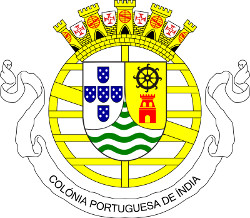
Portuguese India
| Full Name | 120 Estado da Índia Portuguesa | |
| Alliance | Neutral or Non-Belligerent | |
| Possessing Power | Portugal |
Contributor: C. Peter Chen
ww2dbaseThe first Portuguese to arrive at India was Vasco da Gama, who arrived at Calicut (now Kozhikode) in India on 20 May 1498. The arrival of Portuguese traders very quickly turned into a trade war between Portuguese traders and Arab traders, who had been established in Calicut, resulting in many deaths on all sides, including the locals. Ultimately, the Portuguese would prevail, defeating a Mameluk Egyptian and Gujarat Sultanate joint fleet at the Battle of Diu in 1508 and constructing several forts in Calicut to fortify the port. In 1510, the Portuguese defeated the Bijapur sultans, leading to the establishment of a permanent settlement in present day Velha Goa ("Old Goa"), which was to be the capital of the viceroy. In 1843, the capital of Portuguese India was officially moved to Panjim, which was renamed Nova Goa ("New Goa"). By that time, Portuguese India borders had grown along the west coast of India, holding territories from Diu to Goa, though not necessarily contiguous. From Nova Goa, Portuguese governors ruled the State of Portuguese India (Estado da Índia Portuguesa), which included faraway Portuguese colonial holdings such as Mozambique in Africa, Macau in East Asia, and Timor in the South Pacific until the 1700s. During WW2, Portuguese India was a neutral state, following the directive of Portugal, but it did not prevent it from seeing some action. On 9 Mar 1943, the Calcutta Light Horse regiment attacked German ship Ehrenfels, which was transmitting Allied ship movement information to German submarines, in Mormugao harbor in Goa, setting it aflame. The crews of the two other German ships present, Drachenfels and Braunfels, scuttled their ships to prevent British capture. Although Goa, very much like many other neutral and non-belligerent population centers around the world, would continue to be an active ground for spys, no further military action was to take place in Portuguese India for the remainder of the war. Portuguese India would remain a colonial holding after WW2. Dadra and Nagar Haveli were lost to Indian nationalists in 1954. In Dec 1961, as relations deteriorated between India and Portugal, 30,000 Indian troops invaded Goa, Daman (Portuguese: Damão), and Diu, which were defended by only 3,300 lightly armed Portuguese troops. The Governor of Portuguese India signed the Instrument of Surrender on 19 Dec 1961, ending Portuguese influence in the Indian sub continent which began about 450 years prior. Portugal refused to recognize Indian sovereignty over Portuguese India until the fall of the Estado Novo government in 1974; the new Portuguese government restored diplomatic relations with India and recognized the former Portuguese India as Indian territory in 1975.
ww2dbaseSource: Wikipedia
Last Major Update: Jul 2014
| Events Taken Place in Portuguese India | ||
| Operation Creek | 9 Mar 1943 | |
Please consider supporting us on Patreon. Even $1 per month will go a long way! Thank you. Please help us spread the word: Stay updated with WW2DB: |
Visitor Submitted Comments
All visitor submitted comments are opinions of those making the submissions and do not reflect views of WW2DB.
- » Wreck of M-49 Found (10 Apr 2025)
- » Japanese Emperor Visited Iwoto (Iwo Jima) (8 Apr 2025)
- » Race, Holocaust, and African-American WW2 Histories Removed from the US Naval Academy Library (7 Apr 2025)
- » US Government Plans to Purge WW2 Information (17 Mar 2025)
- » See all news
- » 1,167 biographies
- » 337 events
- » 44,606 timeline entries
- » 1,243 ships
- » 350 aircraft models
- » 207 vehicle models
- » 376 weapon models
- » 123 historical documents
- » 261 facilities
- » 470 book reviews
- » 28,500 photos
- » 365 maps
George Patton, 31 May 1944
Please consider supporting us on Patreon. Even $1 a month will go a long way. Thank you!
Or, please support us by purchasing some WW2DB merchandise at TeeSpring, Thank you!
14 May 2019 03:56:32 AM
hi love histoy